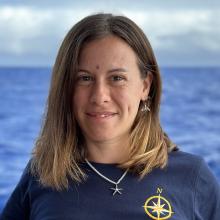
Paula Rodriguez Flores
Tell us about your work/research. What kinds of things do you do?
My research is focused on different aspects of the evolution, biogeography, and systematics of crustaceans and other arthropods, with special emphasis on the taxonomy of Galatheoidea. During my career I have described around 100 new species of squat lobsters and other arthropods, some of them collected by several expeditions of the E/V Nautilus. I am extremely interested in characterizing major patterns of biodiversity within crustaceans as a critical step toward understanding ecological and evolutionary processes promoting speciation in marine environments. I am currently investigating speciation patterns among shallow-water and deep-sea taxa, to place deep-sea main events of colonization, determine and compare rates of diversification-extinction in both environments, and elucidate phylogeographic and population genomic patterns using Ultraconserved elements (UCEs).
What sparked your initial interest in your career?
I've always been totally obsessed with marine invertebrates, especially the creepy animals of the deep sea. When I was a kid, I would go around collecting bugs and tiny crustaceans, sticking them in crystal jars to watch them up close. My shelves were filled with books about all kinds of weird and wonderful creatures. Also, visiting the natural history museum collection in my hometown was always super inspiring. During my college years, my passion deepened as I immersed myself in deep-sea biodiversity through countless hours of watching YouTube videos. The mesmerizing and wonderful nature of the deep-sea creatures led me to pursue a Ph.D. focused on the study of deep-sea crustaceans.
Who influenced you or encouraged you the most?
My parents. They showed me how to love nature, and were always really supportive. They encouraged me to pursue my dreams.
What element of your work/study do you think is the most fascinating?
One of my favorite things is when you suddenly realize that right before your eyes, whether it's through a simple microscope or just your naked eye, lies a new species that has never been seen or described by anyone else. It's like this hidden treasure just waiting to be shared with the world, and you have the incredible opportunity to be the one who brings it to light. It's a wonderful feeling that gives me energy for discovery and drives me to uncover the mysteries of the natural world.
How did you get involved with the Ocean Exploration Trust?
I became aware of OET through my avid following of their streaming expeditions. The opportunity to participate was suggested to me by one of the lead scientists from E/V Nautilus expeditions, who I connect with thanks to my position as a postdoc at the MCZ, Harvard University.
What other jobs led you to your current career?
As a first-generation student, I've taken on various jobs both before and during my college years to support my education and contribute to my family's needs. While pursuing my studies, I had the opportunity to take a scuba diving course. Once I started to dive I fell in love with the undersea wonders and at that moment I decided to study marine invertebrates as a profession.
What are your degrees and certifications?
B.S Biology, University Complutense, Madrid, Spain. Degree: July 2015.
Ph.D. Doctoral Program in Genetics, University of Barcelona, Centro de Estudios Avanzados, Blanes (CEAB-CSIC) and Museo de Ciencias Naturales, Madrid (MNCN-CSIC), Spain. Defense: February 2021.
Rescue Diver CMAS: October 2019
Basic life support in diving accidents for professional divers: last refresh in October 2022
First Aid and O2 provider: last refresh in October 2022
What are your hobbies?
I love reading and writing, especially science fiction and fantasy. I also like watching films in the company of my group of friends. I love to travel around the world and I am a certified scuba diver with more than 400 dives. My ultimate objective is to explore diving all over the oceans and seas.
What advice would you give someone who wants to have a career like yours?
The first piece of advice to pursue a career in academia is, to look for a topic that you are passionate about. Once you have found the topic you want to research, learn and gain knowledge, read the available literature, and take as many courses as you can. Collaboration and mentorship are really important, so search for experts, and mentors and establish connections by participating in activities related to your field. Do not lose enthusiasm, curiosity, and perseverance, even when you fail in academia you gain something.
Expeditions
Paula participated in the following Ocean Exploration Trust expeditions:
